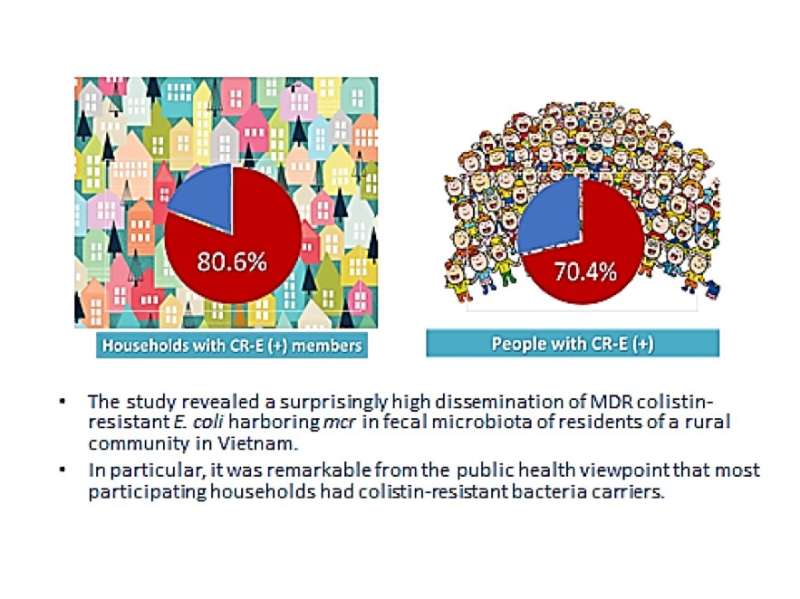Threat of 'nightmare bacteria' with resistance to last-resort antibiotic colistin

A team of researchers led by Osaka University examined the dissemination of colistin-resistant bacteria among residents of rural communities in Vietnam to find that the prevalence of colistin-resistant Escherichia coli (CR-E) in the intestines was extremely high, at about 70 percent. This Escherichia coli (E. coli) is a non-pathogenic bacterium, so the residents have no symptoms, but the detection of this type of E. coli in developed countries has been infrequently reported. It was revealed that the prevalence of colistin-resistant bacteria in residents in Vietnam was extremely high and that colistin-resistant bacteria, whose clinical impact is a great concern in hospital settings, were spread in local communities in the developing country faster than expected.
The team's research results were published in the Journal of Antimicrobial Chemotherapy.
Colistin, an old antibiotic discovered in 1950, kills or inhibits the growth of Gram-negative bacteria, such as E. coli and Pseudomonas aeruginosa. It is one of the few critical antibacterial drugs for treating multidrug-resistant bacteria and is listed on the WHO Essential Medicines List (EML) as a last-resort antibiotic.
Colistin-resistance is mostly related to chromosomal mutations. Although its frequency was low, a certain level of colistin-resistance was observed. However, since colistin-resistance caused by mutations was not transferred to other bacterial species, it was not considered problematic. However, a transmissible colistin resistance gene (mcr) was discovered in China in 2015 and the possibility of the transfer of colistin-resistance to other bacterial species was shown, becoming a global concern. This presents the potential danger that carriage of mcr1 gene in pathogens with other resistance genes will produce super drug-resistant bacteria called "Nightmare bacteria." This bacteria exhibits resistance to all antibiotics, even to the last-resort antibiotic colistin, posing a great threat in infectious disease treatment.
Drug-resistant strains are spread in livestock and livestock products in developing countries. This group has pointed out that meat contains colistin-resistant bacteria because a large amount of colistin has been added to livestock food in Vietnam.
Thus, the group investigated the prevalence of colistin-resistant bacteria in Vietnam and revealed that the dissemination of colistin-resistant Escherichia coli (CR-E) in the faecal microbiota of residents was extremely high (70.4% of residents) and that CR-E had the transmissible colistin resistance gene (mcr).
First author Yoshimasa Yamamoto says, "CR-E carriers don't cause health problems immediately, but it's clear that the number of refractory infections for which antibiotics don't work will increase, which will become a great menace to clinical practice. In this borderless society, drug-resistant bacteria quickly spread beyond national and regional borders, so it is necessary to strengthen international surveillance systems and promptly take preventative measures."
More information: Yoshimasa Yamamoto et al. Wide dissemination of colistin-resistant Escherichia coli with the mobile resistance gene mcr in healthy residents in Vietnam, Journal of Antimicrobial Chemotherapy (2018). DOI: 10.1093/jac/dky435













